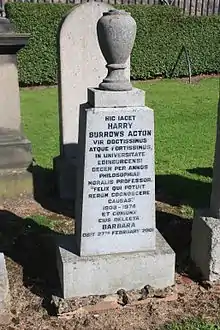H. B. Acton
Harry Burrows Acton (2 June 1908 – 16 June 1974) was an English academic in the field of political philosophy, known for books defending the morality of capitalism, and attacking Marxism-Leninism.[2] He in particular produced arguments on the incoherence of Marxism, which he described as a 'farrago' (in philosophical terms). His book The Illusion of the Epoch, in which this appears, is a standard point of reference. Other interests were the Marquis de Condorcet, Hegel, John Stuart Mill, Herbert Spencer, F. H. Bradley, Bernard Bosanquet and Sidney Webb. Acton also endorsed a version of negative utilitarianism, according to which the reduction of suffering has unique moral importance.[3]
Harry Burrows Acton | |
|---|---|
| Born | 2 June 1908 |
| Died | 16 June 1974 (aged 66) Edinburgh, Scotland, United Kingdom |
| Era | 20th-century philosophy |
| Region | Western philosophy |
| School | Libertarianism[1] |

He had teaching positions at the London School of Economics, Bedford College, the University of Edinburgh where he occupied the Chair of Moral Philosophy, and the University of Chicago. He was editor of Philosophy, the journal of the Royal Institute of Philosophy, of which he was for a time Director. He was president of the Aristotelian Society from 1952 to 1953.
He is buried in Grange Cemetery in Edinburgh close to the main entrance.
Works
- The Illusion of the Epoch: Marxism-Leninism as a Philosophical Creed (1955)
- The Philosophy of Language in Revolutionary France (1959) Dawes Hicks Lecture of the British Academy
- What Marx Really Said (1967)
- Philosophy of Punishment (1969) editor
- Kant's moral philosophy (1970)
- The Morals of Markets: an Ethical Exploration (1971) essays edited by David Gordon and Jeremy Shearmur. 2nd edition (1993), Liberty Fund, ISBN 978-0-86597-106-6
- The Right to Work and the Right to Strike (1972)
- The ethics of capitalism (The Company and its Responsibilities) (1972)
- The idea of a spiritual power: 1973 Auguste Comte memorial trust lecture (1974)
References
- Tom G. Palmer (ed.), Why Liberty, Jameson Books, 2013, p. 30.
- Biographical Dictionary of Twentieth-Century Philosophers. London: Routledge. 1996. p. 4. ISBN 0-415-06043-5.
- Acton, Henry Burrows, “Negative Utilitarianism,” with John William Nevill Watkins, Aristotelian Society Supplementary, 1963, Volume 37:1, pp. 83-114.
External links
- H.B. Acton, The Illusion of the Epoch: Marxism-Leninism as a Philosophical Creed (Indianapolis: Liberty Fund, 2003). See original text in The Online Library of Liberty.